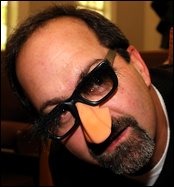Theonomic Plagiarist
From P&R News, Volume 6 Number 2, March—April 2000, page 7:
Steve Wilkins: “Is theonomy Reformed? Of course it is, or why would I embrace it? That’s the pro hominen argument.” * * * * Speaking of contemporary civil magistrates: “They are very good at regulating the price of milk, and what should go on a pizza, but they can’t catch a thief and they don’t know what to do with him if they do.”
Two questions:
- If theonomy is Reformed and “Reformed” is not enough, then is “theonomy” enough? Okay, bad question. Let’s try another:
- If the civil magistrate can’t catch a thief and wouldn’t know what to do with him if they did catch him, then what should a theonomic presbytery do with a plagiarist in their ranks?
Thank you.
































1 comments:
Greetings:
I wrote earlier this evening about the FV/Ron Paul connection.
Such political nonsense aside, over on http://spurgeon.wordpress.com/ there is this quote which, I think, applies well in explaining the influence that Wilson exerts over his followers:
The pull of Pullman
Alan Jacobs is a literary critic and professor of English at Wheaton College. In 2000 Jacobs was interviewed on the Mars Hill Audio Journal about Philip Pullman’s writings (like The Golden Compass) and why he hesitates using Pullman’s works in teaching literature to his college classes. About midway through the interview Jacobs explains how gifted “world-making” authors are especially effective at communicating ideology. He says:
“There is no question that there aren’t very many writers out there more gifted than Philip Pullman and of course that’s what makes it the more disturbing when the gifts are abused. … We [he and his Senior college class] spent a lot of time talking about what’s involved in reading a world-making author like this. It’s an enormously seductive experience. As you come to trust in the author’s ability to make a compelling and fascinating world it becomes harder and harder to mistrust that author’s leadership and direction in moral matters. And so it’s very hard to sort these things out. If you begin to suspect the moral tendency or direction that the book is taking the imaginative wholeness of the vision becomes less compelling to you as well. So I think many readers who love and relish being put into these secondary worlds, who love to immerse themselves in the textures and shapes of a world different than ours, those readers are faced with a great temptation to turn off their moral and spiritual discernment so they are not disturbed in their immersion in this world. It’s a tough thing to try to keep those moral and spiritual antennae working to discern the spirits because you want so much to have an enjoyable reading experience. You don’t want it all to collapse all around your ears.”
Post a Comment